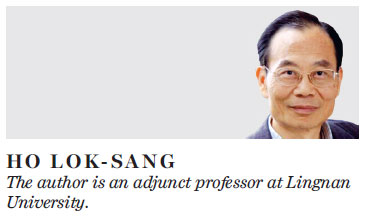A sustainable retirement plan
Updated: 2016-04-19 07:36
By Ho Lok-Sang(HK Edition)
|
|||||||||
Ho Lok-sang suggests a possible retirement protection plan for Hong Kong, which is both practical and sustainable - and without increasing the tax burden
Some legislators announced they will filibuster in order to block funding for the latest Budget. This is to show their discontent over the SAR government's refusal to launch a universal pension plan in Hong Kong.
The government has indicated clearly that it needs to ensure the sustainability of a scheme before going ahead with any scheme. The "universal pension schemes" so far presented to the government, whether by Professor Chow Wing-sun, by "academics" or by the Coalition for Universal Retirement Protection, are all the pay-as-you-go kind. But this failed to impress the government as being sustainable.
The government has a point. Pay-as-you-go plans are not sustainable because of an aging population - caused in part by increasing longevity and in part by declining fertility. This means the tax burden will inevitably have to increase over time.

One of the suggestions made by the advocates is a surtax of a 1.5 to 1.9 percentage points increase in the profits tax for big corporations earning more than HK$10 million a year. This is on top of a contribution that employers must pay on their salary payments each month. This no doubt will make Hong Kong less competitive as a place for attracting foreign direct investment.
Even worse is the prospect of tax increases down the road. Consider the consumption tax in Japan. It was set at 3 percent in 1989 but was raised to 5 percent in 1997, and 8 percent in 2014. It is due for another increase to 10 percent in April next year. To many voters, big corporations can always pay more tax. But there is a cost in terms of competitiveness. This means that workers could lose jobs or face cuts in wages. With a less vibrant economy caused by less investment, the government may also have to cut welfare and social services.
I am not opposed to a universal pension plan in principle, but it has to be fully funded. I have also proposed such a plan before. This is a cohort-based plan that provides old age income support to every Hong Kong citizen. It is designed to be free from the free-rider problem mentioned that could render a pay-as-you-go universal pension scheme unsustainable.
My proposal works like this. All those born in the same year will contribute to and share a common fund, from which a uniform monthly stipend is to be drawn. Each working person will make a standard contribution for himself and for his/her spouse. But a means test will avail those with financial difficulties of a subsidy on the contributions, which could cover as much as 90 percent of the contributions if warranted. Members of the same cohort are expected to retire in the same year and will draw a standard stipend until death.
Thus apart from the means-tested subsidies each cohort effectively supports itself. Since the life expectancy for each cohort is known, it is possible to work out how much of a contribution is necessary for contributions over 40 working years to cover pension needs from retirement (say at 65) through the expected end of a person's life. Those who contribute less will get a fraction of the standard pension on a pro rata basis.
Contributions will be invested, and the government will guarantee a minimum rate of return (say 2 percent in real terms) above which the government will tax "excess earnings" and below which the government will make up for the difference. Over the very long run, a 2 percent real rate of return per year is reasonable. Tax revenue collected in the good years will cover the cost of making up for the shortfall during the lean years.
Such a plan is sustainable because it is a fully funded scheme rather than a pay-as-you-go scheme. A fully funded plan is one which accumulates the funds needed ahead of the dispersion to pensioners. As we know, practically all the pay-as-you-go pension plans today have run into difficulties. Japan, the US, France, the UK, Sweden, Greece, Australia - practically any country you name - has had to reform its pension plans. This may entail raising the contribution rate and the pension age or cutting the stipend.
Advocates of the pay-as-you-go plan all propose a rather modest stipend of not much more than HK$3,000 a month. Such modest amounts are expected to invite calls for raises during good times because they are "obviously inadequate". Since the cost to society is largely ignored, they could pass in the legislature. However, good times may not last forever, yet enhanced entitlements will be difficult to roll back. A cohort-based plan is different as it will be free from the free rider problem. Any demand for a bigger stipend will translate into a bigger contribution.
During the transition to the proposed cohort-based plan, people may be allowed to "buy" contribution years with their savings or with their Mandatory Provident Fund funds on their retirement. This is like buying an annuity. Prior to the existence of a universal pension plan people are expected to save money on their own in anticipation of retirement needs, so most people will have savings with which they can buy contribution years. For those who do not, the government can assist based on a case-by-case consideration.
(HK Edition 04/19/2016 page10)